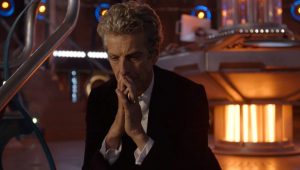Okay, straight talk for a second: Doctor Who is one of my favorite television shows. And aside from a brief listicle in 2015 for the 10th Anniversary of the revived show, I’ve written…well, nothing on this site about the show. And part of the reason is that I wasn’t sure how to handle him, how to do him justice. The Doctor is a pretty massive figure to decipher.
As we discussed last week, he’s a very Christlike figure in many ways; he’s transcendent beyond time and space, he makes people better, he’s a sacrificial hero, and he’s steeped and flooded with destiny. But he’s not perfectly Christlike. Not even close. That’s why he’s been split into two articles: because in this one, we take a look at how, in many ways, the Doctor isn’t lovable; he’s pitiable.
Time Lord Victorious
When he can’t save, he tends to destroy. Without a companion, he turns to vengeance. And without hope, he is a ticking bomb.
 This isn’t the only example. The Eleventh Doctor got mopey when Amy and Rory left him at the hands of the Weeping Angels; the War Doctor traveled alone for so long that he abandoned his very name out of embarrassment and fear for what he might do next. The Doctor doesn’t cope with loneliness or loss very well; he can lose his grasp on what is good and toss away his values. The salvific nature of the Doctor we talked about last week has a painful dark side: when he can’t save, he tends to destroy. Without a companion, he turns to vengeance. And without hope, he is a ticking bomb.
This isn’t the only example. The Eleventh Doctor got mopey when Amy and Rory left him at the hands of the Weeping Angels; the War Doctor traveled alone for so long that he abandoned his very name out of embarrassment and fear for what he might do next. The Doctor doesn’t cope with loneliness or loss very well; he can lose his grasp on what is good and toss away his values. The salvific nature of the Doctor we talked about last week has a painful dark side: when he can’t save, he tends to destroy. Without a companion, he turns to vengeance. And without hope, he is a ticking bomb.
And sometimes, that bomb explodes.
There was a bad day. Bad stuff happened.
He fell from grace and lost everything on the way down.
 Even tossing aside the profound loss of his people, he’s seen companions depart and witnessed heartbreaking loss on a galactic scale. The Doctor is a profoundly tragic character, despite his marvelous life and his amazing ship; he fell from grace and lost everything on the way down.
Even tossing aside the profound loss of his people, he’s seen companions depart and witnessed heartbreaking loss on a galactic scale. The Doctor is a profoundly tragic character, despite his marvelous life and his amazing ship; he fell from grace and lost everything on the way down.
Which might explain why he never really puts down roots.
Bigger on the Inside
His rebellion keeps him spinning, reeling, always running until the corridors run out.
 Like sand slipping through his hands, people and events pass in and out of his long, long life. Without the comfort of a place or a people to return to, he has no true center and must always be going to the next place. Because he chose to turn his back on who he was, the whole universe began to fall apart around him. His rebellion keeps him spinning, reeling, always running until the corridors run out. There’s nowhere for him to go back to because he’s burned all his bridges.
Like sand slipping through his hands, people and events pass in and out of his long, long life. Without the comfort of a place or a people to return to, he has no true center and must always be going to the next place. Because he chose to turn his back on who he was, the whole universe began to fall apart around him. His rebellion keeps him spinning, reeling, always running until the corridors run out. There’s nowhere for him to go back to because he’s burned all his bridges.
Sometimes that’s a good thing. But usually it’s not.
Rule One: The Doctor Lies
Something core to his character in one body could be anathema to his next.
 Often, the new face brings with it a massive culture shock. The Sixth Doctor seemed to show outright disdain for his companion after his regeneration; the Fourth was overcome with a delirium while he recovered from his. And, of course, the Doctor’s personality has changed much; he’s fluctuated between dignified and clownish, between optimistic and cynical, and between caring and aloof across his life. He’s massively different from one version to another, and something core to his character in one body could be anathema to his next. He maintains a moral core: “never cruel or cowardly, never give up, never give in.” But outside of that, he could be anyone.
Often, the new face brings with it a massive culture shock. The Sixth Doctor seemed to show outright disdain for his companion after his regeneration; the Fourth was overcome with a delirium while he recovered from his. And, of course, the Doctor’s personality has changed much; he’s fluctuated between dignified and clownish, between optimistic and cynical, and between caring and aloof across his life. He’s massively different from one version to another, and something core to his character in one body could be anathema to his next. He maintains a moral core: “never cruel or cowardly, never give up, never give in.” But outside of that, he could be anyone.
Of course, this is a brilliant way to keep a show going for fifty-four years; when one actor is tired of playing the role, simply give the task to another person. It defines a key aspect of the show: the Doctor is not consistent, in almost any way. You can’t count on him to be the same the next time you see him. He’s a man of many faces.
And one of those faces looks a lot like us.
Mad Man in a Box
 The Doctor is a Time Lord from Gallifrey; an alien with two hearts and amazing skills. A man who can die over and over again without ever really leaving. But he looks like a normal human, as observed by those who travel with him, and that’s important. We’re supposed to identify with him. We’re supposed to feel pity for him.
The Doctor is a Time Lord from Gallifrey; an alien with two hearts and amazing skills. A man who can die over and over again without ever really leaving. But he looks like a normal human, as observed by those who travel with him, and that’s important. We’re supposed to identify with him. We’re supposed to feel pity for him.
And contrary to last week, whenever we feel pity for the Doctor, that’s when he’s the least like Jesus – because it’s when he’s the most like us.
- We desperately need others. Without others to surround us and bind us up, we quickly become unchained; we lose our grip on what is right and good, and flail madly in the wind. We’re stronger and better when we’re not alone, and God intended that for our sanctification.
- We were born in tragedy. Ours is a terribly tragic story: a fall from grace and the loss of everything we hold dear. We were created by God, but chose to flee from Him in our sin; becoming children of wrath instead of children of light.
![]() We’re perpetually homeless. When we ran from our Father, we gave up our home; our Father’s kingdom is not of this world that we live in. And our rebellion keeps us running; we are citizens of His kingdom, but we won’t get there until Christ returns.
We’re perpetually homeless. When we ran from our Father, we gave up our home; our Father’s kingdom is not of this world that we live in. And our rebellion keeps us running; we are citizens of His kingdom, but we won’t get there until Christ returns.- We’re consistently inconsistent. We never know who we are on our own. Our sin made us aliens to all that is good, and we are untethered apart from Christ. Jesus died – not a dozen times, but once – to secure our identity.
When we see ourselves in the Doctor, these are some of the things we relate to. These truths about us are written on our hearts, because Christ came to save us.
So Much Madder and So Much Better
Far from making us sad, this should give us hope! The Doctor’s greatest drive is to always be better; the Twelfth Doctor told Clara, “Never be cruel and never be cowardly. And if you ever are, always make amends.” It’s his greatest goal and dearest hope for himself, and it resonates with us because God has written a desire to be better upon our hearts.
The Doctor pushes us to realize what God has made us for, and what we’re lacking; and in our longing for that, the Last of the Time Lords keeps us good company.
![]() • • •
• • •
Thanks for reading Redeeming Culture. Of course, the Doctor doesn’t just reflect us. Last week, we talked a bit more about how the Doctor reflects and reminds us of who Jesus is, and why the things we love about him are just reflections of the things God wrote on our hearts about Jesus. We invite you to take a look if you haven’t already. Allons-y!
 We’re perpetually homeless. When we ran from our Father, we gave up our home;
We’re perpetually homeless. When we ran from our Father, we gave up our home;  • • •
• • •















